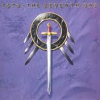The late 70s and early 80s saw American music defy the punk explosion that had become so entrenched in British pop culture and forge ahead with the style that encompassed A.O.R. There were a great number of bands that the American public could latch onto in either camp but the conservative America could be seen as winning through and amongst their musical heroes were bands like Toto.
In the decade that followed Toto’s self-titled debut album, the line-up had changed slightly with Bobby Kimball having been replaced with Joseph Williams and Mike Porcaro joining the group. However the main spine of the band stayed resolute and fast and that was the essence to make the band still very relevant in changing times. With the musical legends of Steve Lukather, David Paich and Steve and Jeff Porcaro still making the band sound hard and enjoyable, the thrash metal revolution and the grunge machine that was following hard on its heels wouldn’t take Toto laying down or giving up too quickly.
In 1988 the band released The Seventh One, an album that whilst not quite hitting the heights of Toto IV or even the group’s eponymous first recording, still offered some great tracks to the majority of those who took the time to sit and listen.
The Thrash Metal experience may have been coming to kick American Rock hard, in pretty much the same way that Punk had seen off a lot of the Progressive Rock of the time across the water in the U.K. but in songs such as the opener Pamela, the outstanding contributions by Steve Lukather Anna and Stop Loving You (the latter with David Piach) and the joint effort by David Paich and Joseph Williams of Straight For The Heart Toto still had something to offer. It may have been inevitable at the time to suggest that like British Progressive Rock, American A.O.R. was coming to a natural, and some would suggest none too soon, end but at least for a while longer they could still own a little piece of the listener’s heart.
What makes the album so good is the music itself. For a change the lyrics take the back seat in Toto’s music and instead what comes across, especially between the core members of the group was a shot at the idealistic, the uncompromising sound that Steve Lukather in particular carries of so well. It is flattering and catchy and unmistakeably Toto.
The album was not that well received at the time of release by some critics but it has lasted well and there are some simply stunning moments that make the album worthwhile in having in a collection. It is also a sad moment for fans of the band as they look back and realise that that it was the penultimate album for drummer Jeff Porcaro. Time would not be kind to the band over the following years but Jeff’s great timing would be remembered fondly by those who bought the records.
The Seventh One started the decline in chart position and appreciation for the band in America (a position that rightfully has been reversed) as the new comers to rock were in a better position to take on the great but seemingly outdated bands that had paved the way from the late 1970s onwards.
Although not as musically an experience as Toto IV, it still has a place in the affections of those who hear it and whilst perhaps unfairly viewed at the time, it remains one of the top three albums by the band to date.
Ian D. Hall
